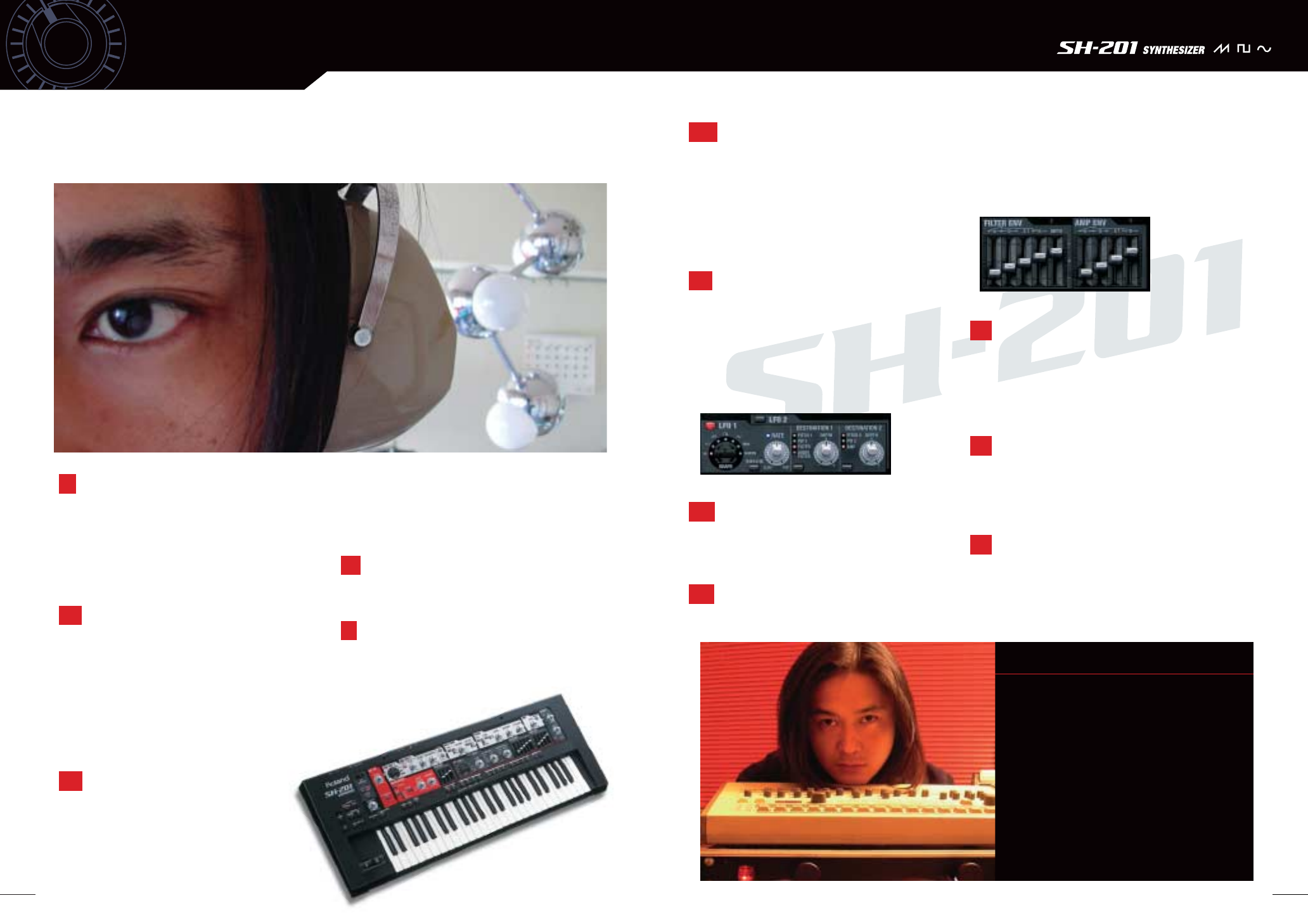
Profile
Hisashi Saito
Hisashi Saito
He has been active in various Techno/Club units within
Japan and overseas since the 1980’s. His involvement
includes development support for numerous musical
instrument manufacturers, appearances in various
events and seminars, along with writing columns
and reviews for various music magazines.
He is an active member of the Japan Synthesizer
Programmers Association (JSPA), an organization
supporting and educating the synthesizer enthusiasts
of tomorrow through various activities promoting
the overall electronic music.
Voice from the Artist
Photo by Isao Nishimoto
Photo by Isao Nishimoto
One look at the panel is all it takes to inspire
your creativity. That’s the SH-201.
I t’s been 26 years since my first encounter
with a synthesizer, and that memorable first
synthesizer was the “Roland SH-2”. At that
time, it was not unusual for synthesizers
to carry a price tag of several thousand dollars
or more. It was truly a dream instrument out
of reach for middle-class citizens.
During that time, the synthesizer to break
the affordable thousand dollar barrier was
Roland’s original SH series, which became
a global success. The synthesizer’s
fundamental signal flow of VCO
➝ VCF ➝ VCA
was easily mastered through the SH-2’s user-
friendly panel layout. The result was a fun
and easy-to-operate machine where sound
creation was thoroughly delightful.
Also, analog synthesizers back then
had many unstable elements,
such as poor pitch and tuning
calibration. However the SH-2
was very consistent
and outstanding in that area among
the others. Best of all, the “Sound” itself is
magnificent and there are still many musicians
who use them today.
Looking back at that time, most people
thought of the synthesizer as a tool
to replicate real-life sound.
In contrast, listing to the latest music trend,
numerous sound/music producers have created
sounds that only synthesizers can produce,
and listeners are demanding these
sounds as well.
Most of the PCM synthesizers have set their
goal on the pursuit of reality or replication.
I am glad to see that this particular
synthesizer, the SH-201, is built upon
the ultimate pursuit of the “synthesized
sound” itself. One look at the panel is
all it takes to inspire your creativity.
That’s SH-201.
T he eight oscillator waveforms are carefully
selected and distinctively different
from the PCM in the way they possess
the ultimate analog-modeling qualities.
The smooth-yet-aggressive contour
of the filters is the result of Roland’s quarter
of a century experience and technological
innovation.
Of course, it’s quite obvious to see that
many creative modulation-based effects can
be achieved through the LFO, the synthesizer’s
backbone function.
As for the controls, rotary knobs are used
for controlling filters, pitches, and rates,
and the vertical faders are used to control
the time-variable parameters such as
the envelope generator for easy visual setting.
It’s design with sound creation as the top
priority is simply superb.
T oday, evolution in the electronic-music
industry has placed the synthesizers with large
memory capacity in the mainstream.
It is also a fact that most keyboardists rely
on enormous sound libraries and preset
sounds.
T hat is where the SH-201 comes in,
as it allows you to easily create “sounds from
scratch” with its simple analog controls,
the way synthesizers were designed to do
in the first place.
T he SH-201 is truly a 21st century
masterpiece, with its lightweight body
and incredible cost performance.
I hope you take your time and thoroughly
enjoy this incredible instrument!
25 26

















